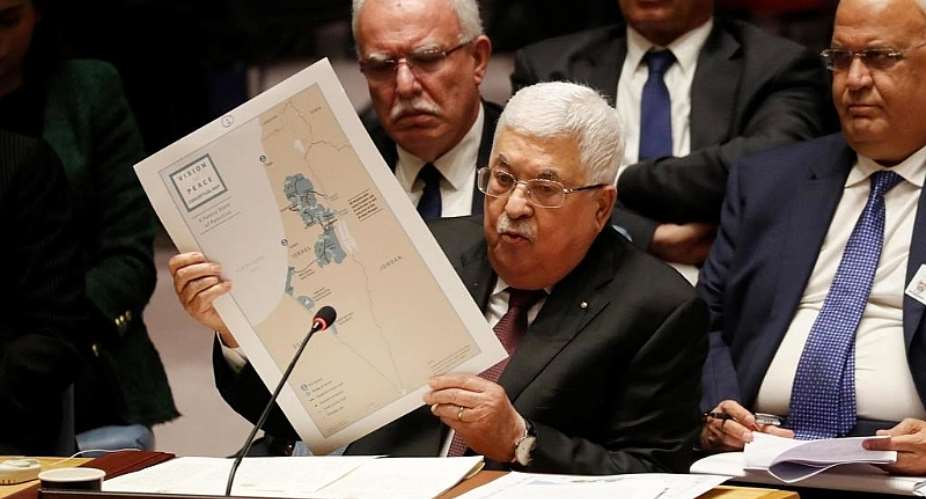Palestinian President Mahmoud Abbas has told the UN Security Council that the world should reject US President Donald Trump's Middle East plan, calling it an outside imposition that cannot bring lasting peace.
Brandishing a large map of Israel and Palestine as laid out by Trump's long-awaited 28 January announcement, Abbas called it a "Swiss cheese" deal that would limit Palestinian sovereignty.
"I would like to say to Mr. Donald Trump that his plan cannot achieve peace and security as it cancels international legitimacy," Abbas told the Security Council.
"It cancels all the rights of the Palestinians. This does not meet the aspirations of a two-state solution," he said.
"If you impose peace it will not last, it cannot last," he said, asking: "What gives you the right to annex these lands?"
Abbas said that peace with Israel remained "achievable" adding "I have come to build a just partnership."
A one-sided deal can not be imposed on Palestine
"This deal is not an international partnership. This proposal was from one state, supported by another state to be imposed."
The Palestinians have sought to rally international support against the plan, which Trump unveiled alongside Israeli Prime Minister Benjamin Netanyahu, who has since moved forward with efforts to annex vast areas of the West Bank.
While the Palestinians have refused to deal with Trump, seeing him as biased, Abbas said his first encounters with the billionaire-turned-president had been positive.
Trump, whose evangelical Christian base is strongly supportive of Israel, has since taken a series of landmark steps such as recognising contested Jerusalem as the capital of the Jewish state and ending assistance to the UN body that helps Palestinian refugees.
Widespread criticism of Trump plan
The Palestinians have won support from the Arab League, the Organization of Islamic Cooperation and the African Union which have all rejected Trump's plan.
On Tuesday, the four European Union members of the Security Council -- France, Germany, Belgium and Estonia -- as well as Poland, which left the council at the end of last year, jointly said that any Middle East solution needs to be based on pre-1967 lines, a reference to settlements built since the Jewish state captured the West Bank in the 1967 Six-Day War.
Trump's plan "departs from these internationally agreed parameters," they said in a joint statement, while applauding "all efforts" to reach a peaceful resolution.





 Dumsor: Mathew Opoku Prempeh has been disrespectful, he should be fired – IES
Dumsor: Mathew Opoku Prempeh has been disrespectful, he should be fired – IES
 NPP prioritizing politics over power crisis solution — PR Strategist
NPP prioritizing politics over power crisis solution — PR Strategist
 E/R: Gory accidents kills 3 persons at Aseseaso, several others critically injur...
E/R: Gory accidents kills 3 persons at Aseseaso, several others critically injur...
 Nobody can come up with 'dumsor' timetable except Energy Minister – Osafo-Maafo
Nobody can come up with 'dumsor' timetable except Energy Minister – Osafo-Maafo
 Dumsor: You ‘the men’ find it difficult to draw timetable when ‘incompetent’ NDC...
Dumsor: You ‘the men’ find it difficult to draw timetable when ‘incompetent’ NDC...
 We’re working to restore supply after heavy rains caused outages in parts of Gre...
We’re working to restore supply after heavy rains caused outages in parts of Gre...
 NPP government plans to expand rail network to every region — Peter Amewu
NPP government plans to expand rail network to every region — Peter Amewu
 Dumsor must stop vigil part 2: We’ll choose how we demonstrate and who to partne...
Dumsor must stop vigil part 2: We’ll choose how we demonstrate and who to partne...
 2024 elections: NDC stands on the side of morality, truth; NPP isn't an option —...
2024 elections: NDC stands on the side of morality, truth; NPP isn't an option —...
 Akufo-Addo has moved Ghana from 'Beyond Aid' to ‘Beyond Borrowing’ — Haruna Idri...
Akufo-Addo has moved Ghana from 'Beyond Aid' to ‘Beyond Borrowing’ — Haruna Idri...
